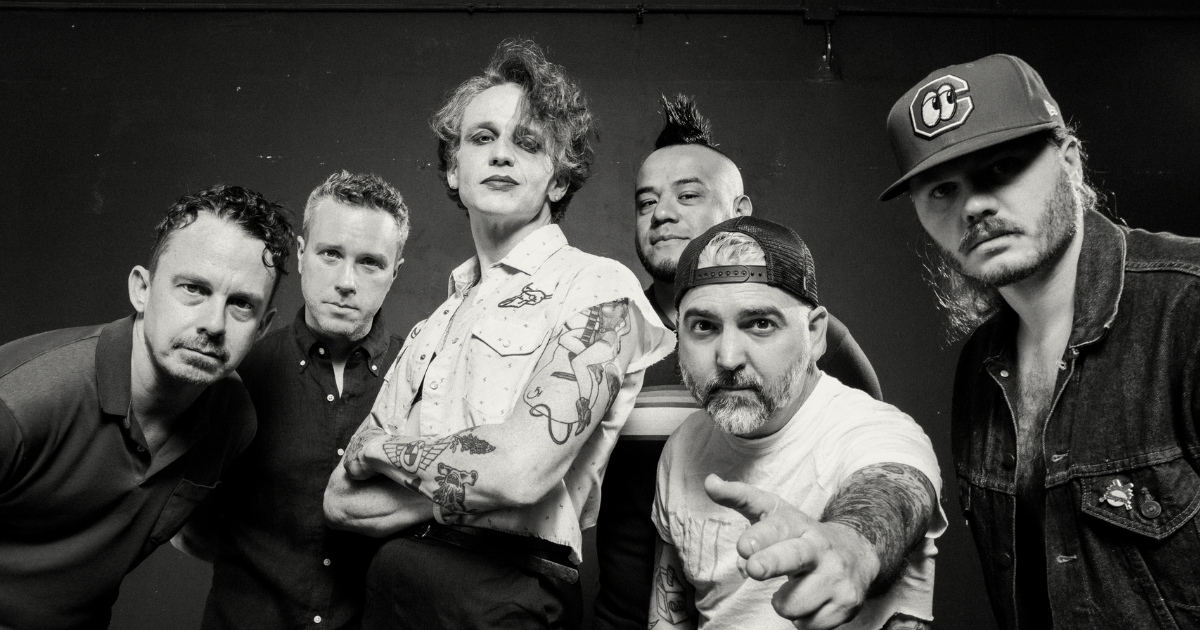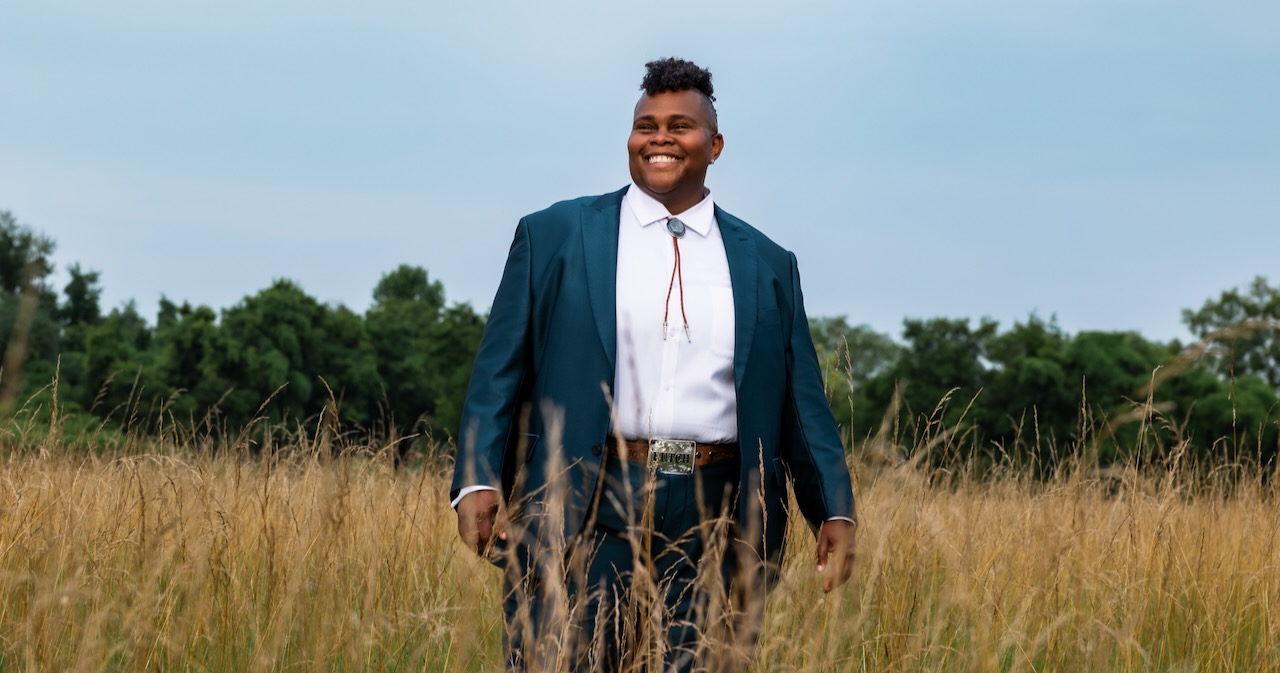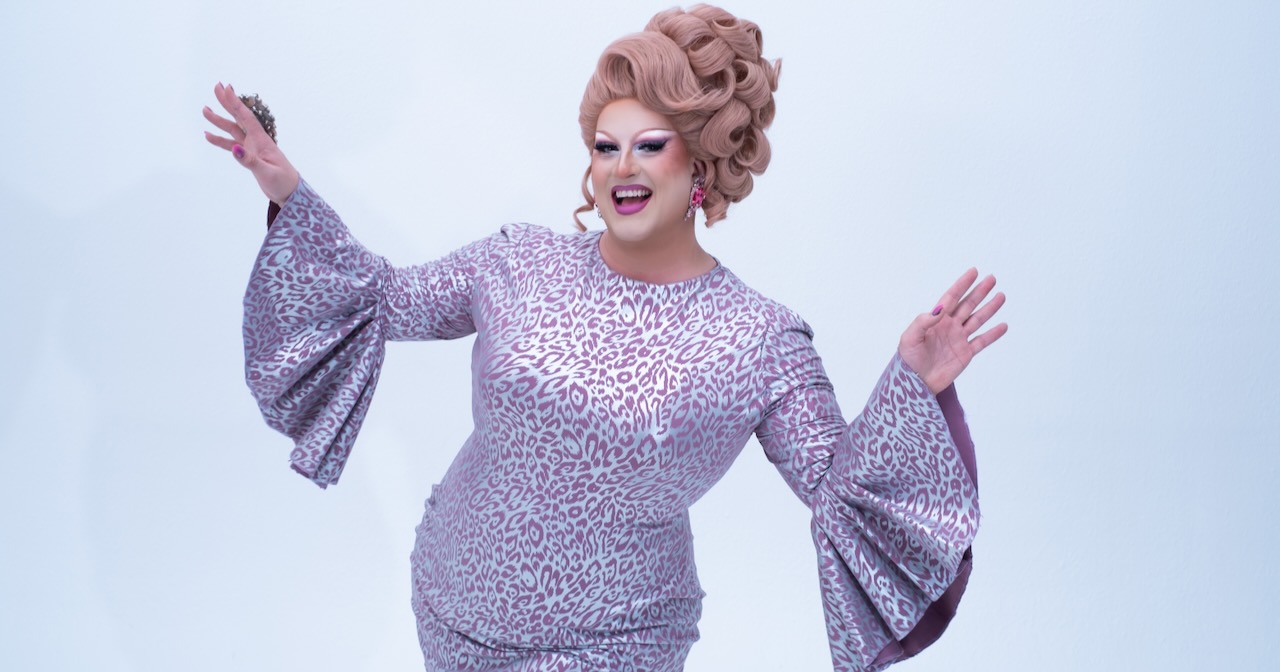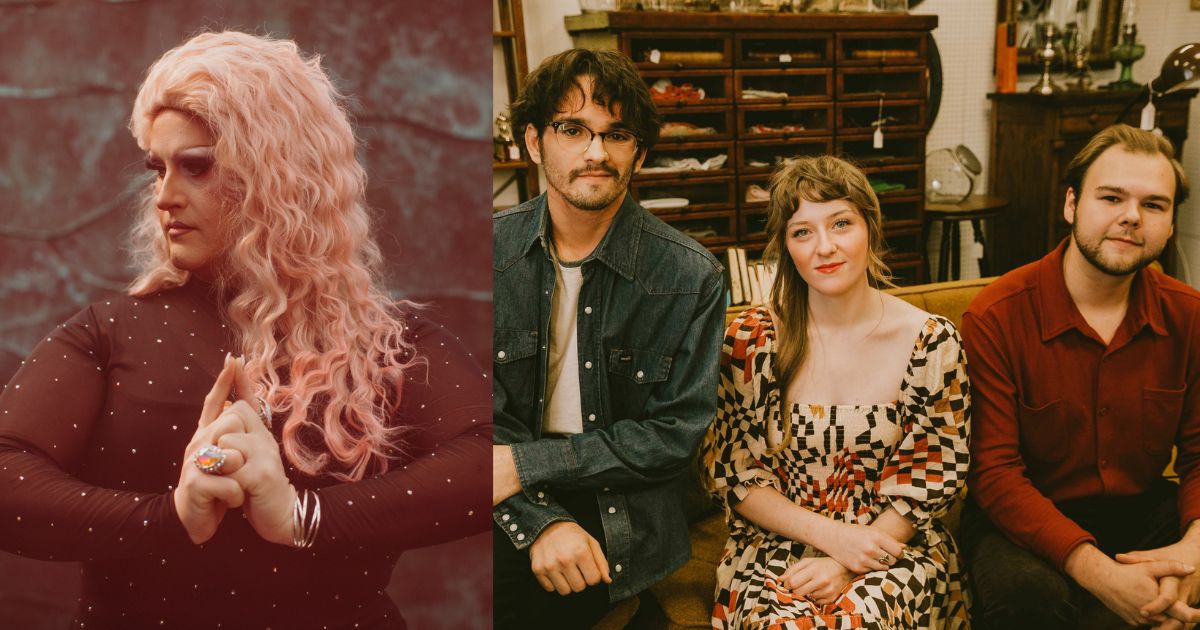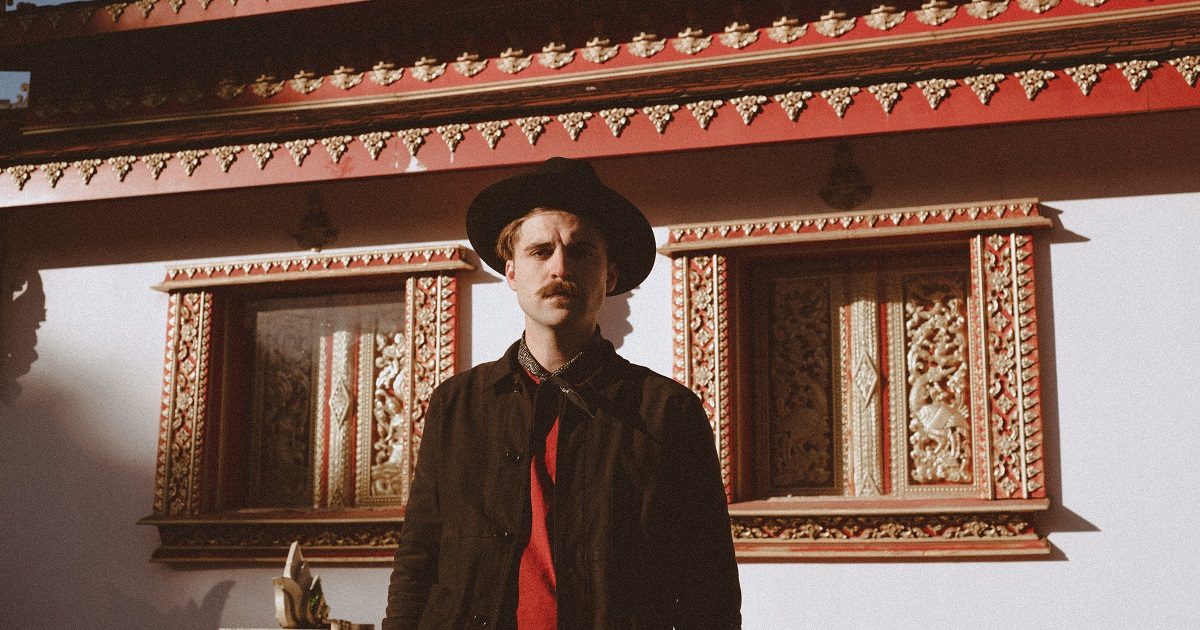Vandoliers are doing their part to keep the spirit of alt-country alive with their raucous blend of punk, country, and mariachi. In other words, they’re the quintessential Texas dive bar band.
They’ve long been outspoken supporters of the queer community, going viral for protesting the Tennessee Drag Band by performing in dresses as a protest; that was when lead singer Jenni Rose realized that she may be a member of the LGBTQIA+ community herself. And so, the band’s fifth and newest album, Life Behind Bars (released June 27), finds the Vandoliers exploring the wild desert landscape of the heart: sobriety, grief, gender dysphoria — and joy in liberation.
Good Country spoke with group members Rose and multi-instrumentalist Cory Graves in early June about collaborating as a six-piece band, working with producer Ted Hutt to push the band to ever-more lyrical honesty and musical proficiency, and the profound impact Jenni’s sobriety and coming out has had on the band.
The album’s title track, “Life Behind Bars,” deals in part with frustrations of life on the road – but Vandoliers are known for bringing the party. How do you balance these two realities?
Jenni Rose: I couldn’t be a lead singer of this band unless I got sober. I tried really hard to be the party person and be the lead singer and be able to do this hundreds of times a year. I just couldn’t do everything. Put the party down for a little bit, and that brought up so much in my life. It made the shows exponentially better. It made me a better singer. On this record, you’re really hearing me processing this new identity, this new life unfolding. It starts with the question, “Why can’t I get sober?” and then it’s like – “Oh my God, I’m in the wrong body.”
I was dealing with a lot. Cory was dealing with a lot, the whole band was dealing with a lot. We have made four records of us asking, “Where am I at in my life? What am I going through?” We’ve been able to conquer the humorous and the serious, so we weren’t really out of our comfort zone by talking about big feelings, but they’re in this album for sure.
The song has four co-writers: you two, Joshua Ray Walker, and John Pedigo – Texas royalty for sure. While it’s common for pop country songs to have many writers, it’s a bit unusual in the Americana world. How did you all even find yourselves in one place together?
JR: Josh Walker and I are really close. I was with him a lot during his cancer diagnosis. We were catching up and we were about to go to Sonic Ranch to record. I suggested we just go write a song and call up John, who used to produce our records. He pretty much has a co-write on every Vandoliers record except for the last one. We love writing together.
Josh Walker brought up the frustrations with touring and we were talking about how we can keep doing it. Then we thought, “Let’s say we didn’t do it. What else are we gonna do? What kind of jobs are hiring 40-year-olds for entry-level positions?” Cory and Josh had been talking about this line “life behind bars” as a double entendre for years. We all related to it and everybody just started throwing out lines. And then by the end of it, we were all screaming the hook and we had a song.
When you began working with producer, Ted Hutt, he said your songs were “superficial” and pushed you to go deeper. How was it to hear that feedback?
JR: It was wonderful. That conversation was like a year before we got to the studio. So I came in with like 40 tunes. Cory came in with like six or seven. Ted really took the time to listen to our writing and pick the songs that were right for the record. He pushed me so hard with my lyric writing and my vocal performance.
I was writing and rewriting things, clarifying, digging deeper into what I was trying to say and that opened me up to a lot of emotions. I knew I was gonna hit gender dysphoria, but I didn’t know I was gonna hit it there. Then [the] Pandora’s Box was completely opened.
Cory Graves: We’ve always craved a producer that would come in and be like a seventh voice in the room, like a tiebreaker voice or someone who could come in with other ideas. We’ve gotten that a little bit here and there in the past, but never as much as I think some of us wanted. He was heavy-handed, like suggesting we change a song from a punk song to a country song or changing the key.
We all knew that we wanted that. Going in, we all agreed that if Ted wanted to try something, everyone would just be happy about it and try it. That’s exactly what happened. It always worked out for the better.
What lessons do you think you’ll bring with you from this process?
JR: I’m already better at being fully vulnerable when I write. Life Behind Bars is me opening up, whereas some of my writing right now is pretty brutal. I’m excited about moving forward being fully aware and shameless in my writing now.
The band itself is so collaborative, by nature of the kinds of sounds you make. How does the band work together?
CG: We all have so many different influences. None of the songs ended up sounding like the demos. They ended up sounding like a piece of everyone. My song, “Thoughts and Prayers,” was more of a punk song, but ended up as a rockabilly song. “Life Behind Bars” started as an emo song while “Bible Belt” was kind of like a Green Day song. Now it’s like The Cars meets, like – I don’t know. So many different things. There’s a twang to it, but also ’80s rock, because Dustin [Fleming], our guitar player, was in a Cars cover band. So he’s got that in his blood.
There are different things that we each bring out from our past into the tunes.
Jenni, it sounds like for a while you isolated yourself socially from the band a bit. How do you both feel things have changed since you’ve come out?
JR: When I was trying to quit drinking, I changed all of my habits just to make sure that I could. It would have jeopardized my career if I kept going the way that I was going. I didn’t wanna do that, ’cause it’s not just my career, it’s everybody’s career. So I started going to the gym after the shows and then journaling during the day, having a ten-minute free write, word-vomit of poetry that I would send to Ted. I would do this every day and that would take me three hours – most of the van ride. So I’d be in my headphones, dead silent with everybody, and I was cocooning. I was going through a lot and I was trying to heal while in motion.
So everybody got to live with a hermit, essentially, for three years. I know it wasn’t cool, but I had to do it. I’m writing these songs. I’m reading every fucking self-help book I can possibly grab to figure out why I’m an addict. The dysphoria is starting to pick up and ramp up, because I’m starting to understand my emotions instead of dull them and ignore them. I am becoming more in tune with my body at the gym and noticing the dysphoria there and starting to understand myself better and better and better. While all of this is happening, I’m on fucking tour all over the world with six other people.
They’re watching somebody change the way that they eat. They’re watching somebody change what they do during the day. They’re watching my social life become pretty much non-existent. … Everybody becomes [at] arm’s-length on the road for a couple years. And then at a Taco Bell, I tell everybody I’m a trans girl and it’s like I’m right back to the party, I can like hang out again, I can go out after the show, or I can skip the gym. … I’m existing as my highest self after years of searching.
It sounds like your coming out has been a fairly positive experience so far.
JR: I saw immediately how quickly my relationships have been healing since coming out. Each person I told – before coming out publicly – it was great. Now I just get to be in a band with my friends again and they get to know me fully without me being scared of rejection.
I can’t manipulate anybody into accepting me. I can’t control how they feel about me. There’s nothing I can say that would make them either love me or not love me. You just kind of get to figure out who’s with you or not. I am so blessed that the people that are around me are at such a high quality. I think it’s a testament to just my exquisite taste in humans. I’ve been so blessed.
Everybody around me loves me and wants me to keep going and wants to keep being in my life, which is not what I thought that they would do. I assumed that I would be abandoned by everybody, because that’s the narrative that we’re all used to, but it’s been really beautiful. I’m really glad I did it.
Your coming out process has been very public. Your band went viral for protesting the Tennessee drag ban the day it was passed by wearing dresses on stage. And now, you’ve come out in Rolling Stone. So, how are you doing?
JR: Wearing the dresses was Cory’s idea. I have worn so many dresses behind closed doors. No one knew this side of me. When we went shopping for dresses, we all were having fun. When I put it on I was so nervous, but I was also really comfortable. And then we went out and played and I twirled. I had a great time. I thought only like 80 people were gonna see this, that I’d wear a dress for this one show and that would be it. Then everybody saw it.
That was kind of when I realized I had this aspect of me. It was the first time anybody had seen it and everybody kind of saw it at once. It made me wanna drink again, ’cause I didn’t want this to keep multiplying because I was scared. It wasn’t the first time I’d worn a dress and I knew that that wasn’t the first time that I felt comfortable doing so. I didn’t know if I wanted to accept that, or think that it was anything more than a kink or whatever. But I was sober and I did have to deal with it, and I did have to talk about it with my family and my wife.
If anybody’s reading this and they’re questioning if they should come out, you should. It’s good for you.
What are you each most excited about getting the album out in the world and touring it?
CG: I’m excited that people are gonna hear a little bit of a different side of us and to see what they think of it. I think more people are gonna be aware of us than ever, and I’m excited to see how people react to that.
Also, I’ve been doing music for, I don’t know, 20-something years. I’m 41 years old. I’ve never sung a lead vocal on any record in my entire life. I’m just excited for that [“Thoughts and Prayers”] to be in the world. That’s a big accomplishment for me, personally.
JR: I’m glad you sang it. You sang it much better than I was singing it!
I am most excited to be seen as 100% me on the road and to see what that does. So far, it’s been really magical. I think it’s been really positive. As I’m out and I’m playing, these bars or venues or theaters or little music series or festivals, they’re gonna see a trans person in a band, maybe at a country festival, maybe in a small town, maybe at a place that they wouldn’t usually see a queer person, and they’re gonna have to figure out how they feel about that.
I think the thing that I’m most excited about is posing that question to people and giving them a chance to react. I have faith in our fans, but I also have faith in our country, too. I don’t think hate has as much of a stronghold as we might think. It’s there for sure, but I think there’s a lot of love too.
Photo Credit: Vincent Monsaint
